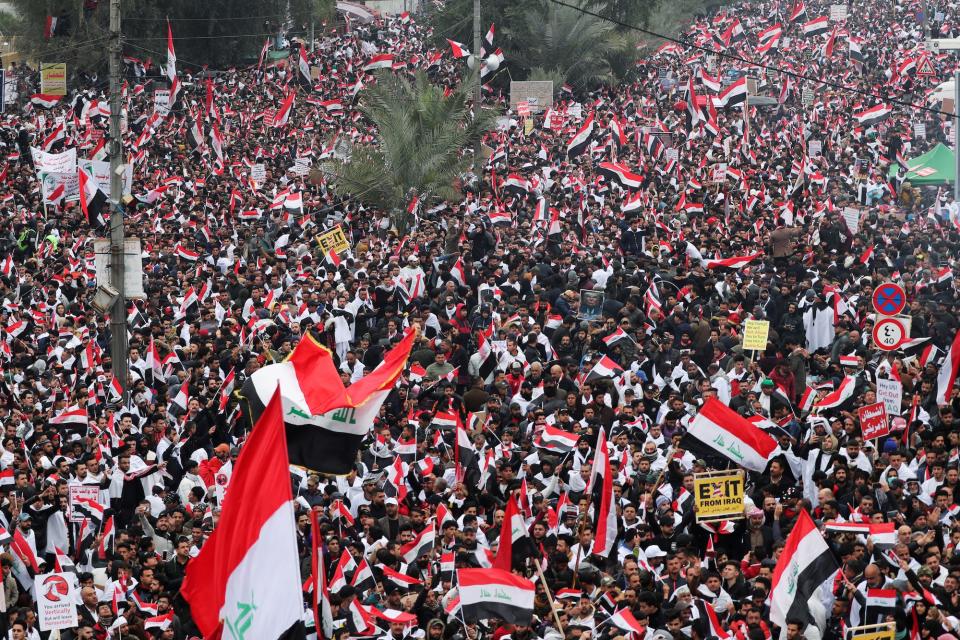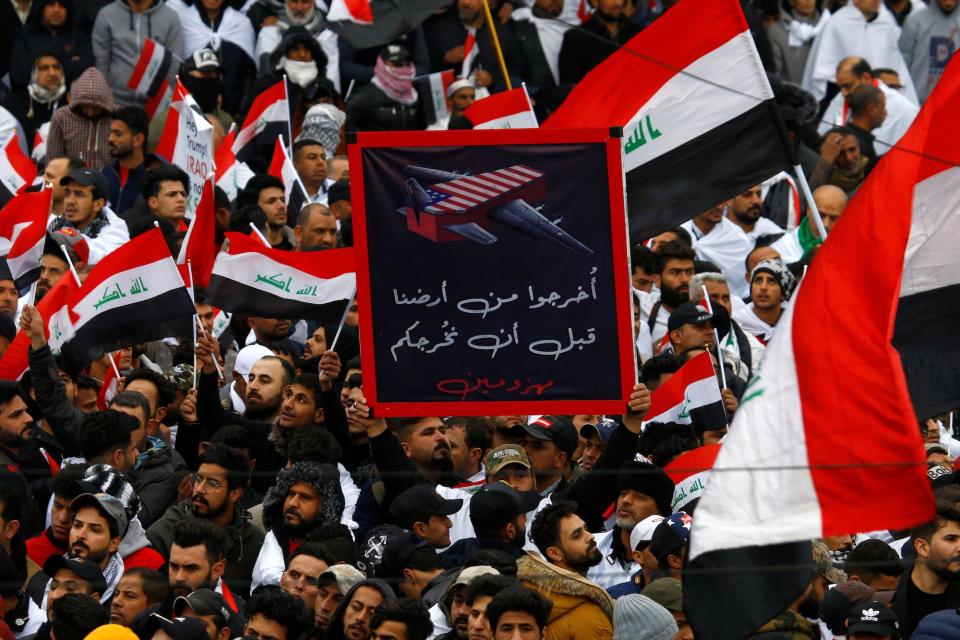A quarter of a million Iraqis protested the US military's 'occupation' of their country

Alaa al-Marjani/Reuters
Hundreds of thousands of Iraqis poured into Baghdad's streets Friday to call for the expulsion of the roughly 5,200 US troops based in their country.
There have been growing calls among Iraqis, including a vote in Parliament earlier this month, for US troops to leave since the killing of Iran's top general, Qassem Soleimani.
President Donald Trump ordered the drone strike that killed Soleimani, as well as a powerful Iraqi militia leader, near Baghdad airport on January 3.
Hundreds of thousands of Iraqis on Friday flooded the streets of Baghdad to protest against the ongoing presence of US troops in their country.
It's estimated as many as 250,000 people participated in the protest, according to the New York Times, after a prominent anti-US Shia cleric, Muqtada al-Sadr, called for a "million man march."
Signs held by participants said "no, no to America" and "no, no to occupation," CNN reported, as images of the protest depicted a sea of people holding Iraqi flags.

Alaa al-Marjani/Reuters

Thaier al-Sudani/Reuters

Alaa al-Marjani/Reuters
Iraqi President Barham Salih, who met with President Donald Trump earlier this week in Switzerland, tweeted an image of Friday's protest.
"Iraqis insist on a state that is not fully violated, serving its people and expressing their independent national will, free from interference and dictates from abroad, a state that guarantees their security and rights in a free and dignified life, a state in security and peace with its neighbors," Salih said in the tweet.
—Barham Salih (@BarhamSalih) January 24, 2020
Separately from Friday's mass demonstration, Iraqis have been protesting for months against corruption and inept governance, but also in opposition to the outsized influence of external forces in their political system — especially Iran. Iraqi security forces have responded to the largely peaceful protests with deadly violence, killing over 600 people since October, including at least 12 this past week, according to a report from Amnesty International.
The protest on Friday was extremely orchestrated and also had the support of Iran-backed militias in Iraq.
There have been increasing calls in Iraq for the US to get out since Trump ordered the Soleimani strike
The massive demonstration in Baghdad came less than a month after President Donald Trump ordered the drone strike that killed Iran's top general, Qassem Soleimani, as well as a powerful Iraqi militia leader at Baghdad's airport.
The Soleimani strike pushed the US and Iran to the brink of war, and prompted a missile attack on US and coalition forces in Iraq. The Iranian missile strike left dozens of US troops with concussions and traumatic brain injuries, some of whom were evacuated from the country for treatment and evaluation.
The January 3 drone strike also led the Iraqi parliament to vote to expel all of the roughly 5,200 US service members who are stationed in the country as part of ongoing operations against ISIS; the resolution is non-binding. The Iraqi government accused the US of violating its sovereignty with the Soleimani strike. The US paused operations in Iraq for over a week after the strike, resuming joint operations with Iraq around the middle of January.
The Trump administration has rejected calls from acting Iraqi Prime Minister Adel Abdul-Mahdi for a road map toward withdrawl.
The US military had a continuous presence in Iraq from the time it invaded in 2003 until the withdrawal of troops in 2011, returning just three years later in 2014 at the invitation of the Iraqi government to help thwart ISIS.
Trump says Iraq 'likes' what US troops are doing there
After Iraq's parliament voted to expel US forces in early January, Trump threatened to hit the country with sanctions harder than those leveled against Iran.
"We will charge them sanctions like they've never seen before ever," Trump said. "It'll make Iranian sanctions look somewhat tame."
Trump took a softer tone while meeting with the Iraqi president in Davos, Switzerland, on Wednesday.
Before the meeting, when asked about the potential for a US troop withdrawal from Iraq, Trump said, "We're talking about a lot of different things and you'll be hearing whatever we do. But they like what we're doing and we like them, and we've had a very good relationship."
And when asked about his threat to impose sanctions, Trump said, "We'll see what happens, because we do have to do things on our terms."
Meanwhile, the office of the Iraqi president in a statement said: "During the meeting, reducing foreign troops and the importance of respecting the demands of Iraqi people to preserve the country's sovereignty were discussed."
The Soleimani strike came after a year of increased tensions between Washington and Tehran and a series of escalatory events in the Persian Gulf region.
In the days leading up to the strike, an Iran-backed militia, Kataeb Hezbollah, killed a US contractor and injured several service members in a rocket attack in Kirkuk, Iraq. The US retaliated with airstrikes that killed dozens of the militia members. Subsequently, there was a violent protest at the US Embassy in Baghdad.
When asked if there were concerns about the safety of personnel at the Baghdad embassy and if extra precautions were being taken, a State Department spokesperson on Thursday told Insider, "We are aware of the planned protests. The Department of State has no higher priority than the safety and security of our personnel. We will not discuss our security measures."
Read the original article on Business Insider

